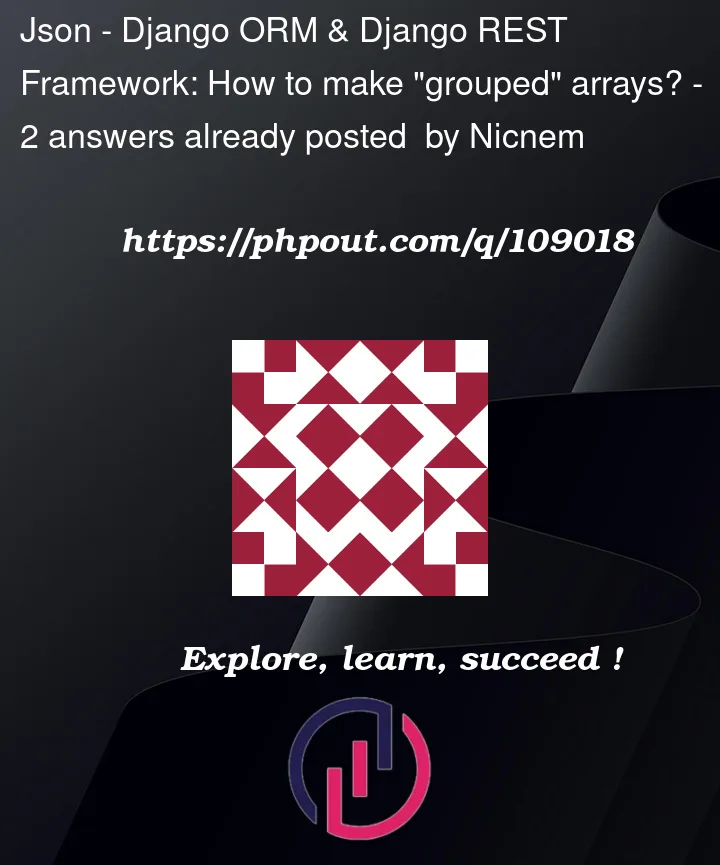Currently, my Django server can return the JSON below:
[
{
"id": 1,
"customer": {
"id": 1,
"name": "John Doe"
},
"description1": "...",
"description2": "...",
"description3": "...",
"description4": "..."
},
{
"id": 2,
"customer": {
"id": 1,
"name": "John Doe"
},
"description1": "...",
"description2": "...",
"description3": "...",
"description4": "..."
},
{
"id": 3,
"customer": {
"id": 1,
"name": "John Doe"
},
"description1": "...",
"description2": "...",
"description3": "...",
"description4": "..."
},
{
"id": 4,
"customer": {
"id": 2,
"name": "Jane Doe"
},
"description1": "...",
"description2": "...",
"description3": "...",
"description4": "..."
},
{
"id": 5,
"customer": {
"id": 2,
"name": "Jane Doe"
},
"description1": "...",
"description2": "...",
"description3": "...",
"description4": "..."
}
]
My models are:
from django.db import models
class Customer(models.Model):
name = models.CharField(verbose_name="Customer name")
from django.db import models
class PurchaseDescriptions(models.Model):
customer = models.ManyToManyField("customer.Customer", related_name="customer", verbose_name="Customer")
description1 = models.CharField(verbose_name="Description 1")
description2 = models.CharField(verbose_name="Description 2")
description3 = models.CharField(verbose_name="Description 3")
description4 = models.CharField(verbose_name="Description 4")
my serializers are:
from rest_framework import serializers
class CustomerSerializer(serializers.ModelSerializer):
class Meta:
model = Customer
fields = [
"id",
"name",
]
class PurchaseDescriptionsSerializer(serializers.ModelSerializer):
customer = CustomerSerializer()
class Meta:
model = PurchaseDescriptions
fields = [
"id",
"customer",
"description1",
"description2",
"description3",
"description4",
]
and my viewset is:
from rest_framework.viewsets import GenericViewSet
from rest_framework import mixins
class ScheduleViewSet(
mixins.ListModelMixin,
GenericViewSet,
):
queryset = PurchaseDescriptions.objects.all()
serializer_class = PurchaseDescriptionsSerializer
I want to rewrite it and make some groups based on customer, e.g.
[
{
"customer": {
"id": 1,
"name": "John Doe"
},
"data": [
{
"id": 1,
"description1": "...",
"description2": "...",
"description3": "...",
"description4": "..."
},
{
"id": 2,
"description1": "...",
"description2": "...",
"description3": "...",
"description4": "..."
},
{
"id": 3,
"description1": "...",
"description2": "...",
"description3": "...",
"description4": "..."
}
]
},
{
"customer": {
"id": 2,
"name": "Jane Doe"
},
"data": [
{
"id": 4,
"description1": "...",
"description2": "...",
"description3": "...",
"description4": "..."
},
{
"id": 5,
"description1": "...",
"description2": "...",
"description3": "...",
"description4": "..."
}
]
}
]
But I don’t know how to make this using Django’s views and serializers. How can I get such JSON? Note that I want to avoid creating additional tables in the database if it is possible.




2
Answers
You can override the serializers to_representation() to get custom JSON response.
Give this a try:
ViewSetList’s response
즐코하세요
++++
If you want to implement it in a way that doesn’t use a MethodField, you can use a Concat in a QuerySet to get the customer data in JSON format.
You can configure your queryset this way and use the
implement the Serializer as shown above.
but, above case’s queryset is too messy, so I use SerializerMethodField.